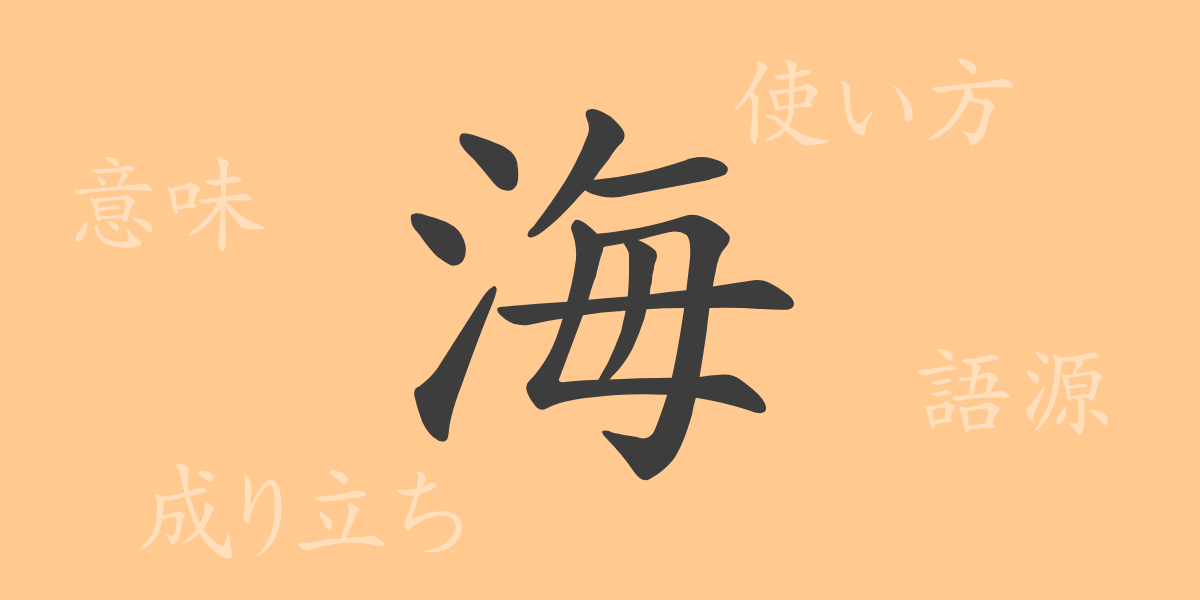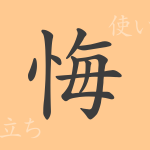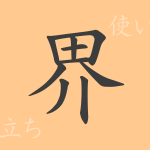The majestic “sea” (海)(Umi) that surrounds the Japanese archipelago has been deeply rooted in the lives, culture, and hearts of people since ancient times. In this article, we delve into the allure of the commonly used kanji “sea” (海)(Umi), explaining its origins, meanings, usage, readings, stroke count, and radical in detail. Furthermore, through idioms, phrases, and proverbs that include “sea” (海)(Umi), we will explore the profoundness of the word and the Japanese people’s sentiments towards the sea.
Origins of the Kanji for Sea
The history of the kanji “sea” (海) (Umi)is ancient, and its shape is formed by combining the part that means water “氵” with “毎”. Originally, “毎” signified “mother”, symbolizing the sea as a source of life. Additionally, according to ancient Chinese documents, the sea was referred to as “a great expanse of water”, indicating a vast, boundless area of water.
Meaning and Usage of Sea
The kanji “sea” (海)(Umi) not only refers to a large body of water but also encompasses aspects such as a treasure trove of marine life, a hub for transportation, and a natural threat. In Japan, there is a national holiday called “Marine Day” (海の日)(Umi-no-hi), reflecting the cultural reverence and gratitude towards the sea. In terms of usage, it is found in various words closely related to daily life, such as “sea bathing” (海水浴)(Kaisuiyoku), “overseas travel” (海外旅行)(Kaigairyokou), and “seafood” (海産物).
Readings, Stroke Count, and Radical of Sea
The kanji “sea” (海) (Umi)is one of the essential characters taught in school education as part of Japan’s common-use kanji.
- Readings: The on’yomi (Chinese reading) is “kai” (Kai), and the kun’yomi (Japanese reading) is “umi” (うみ).
- Stroke Count: It consists of 9 strokes in total.
- Radical: The radical is “water” (水)(Mizu), and many kanji that include this radical are related to water in meaning.
Idioms, Phrases, and Proverbs Using Sea and Their Meanings
There are numerous idioms, phrases, and proverbs in the Japanese language that include the word “sea” (海)(Umi). “Sea and mountain thousand” (海千山千)(Umisenyamasen) refers to someone who is experienced and shrewd, “neither of the sea nor of the mountain” (海のものとも山のものとも)(Umi-nomotomo-yama-nomonotomo) expresses something that is difficult to identify, and “beyond the sea and over the mountains” (海を越えて山を越えて) is used to describe a very long distance.
Conclusion on Sea
The “sea” (海)(Umi) is both familiar and sacred to the Japanese, a mystical and revered entity. It is our hope that through this article, you have gained insight into the history and culture behind the kanji “sea” (海)(Umi). The many meanings and uses of the sea are indispensable elements of our lives and will continue to be cherished and passed down for generations to come.

























